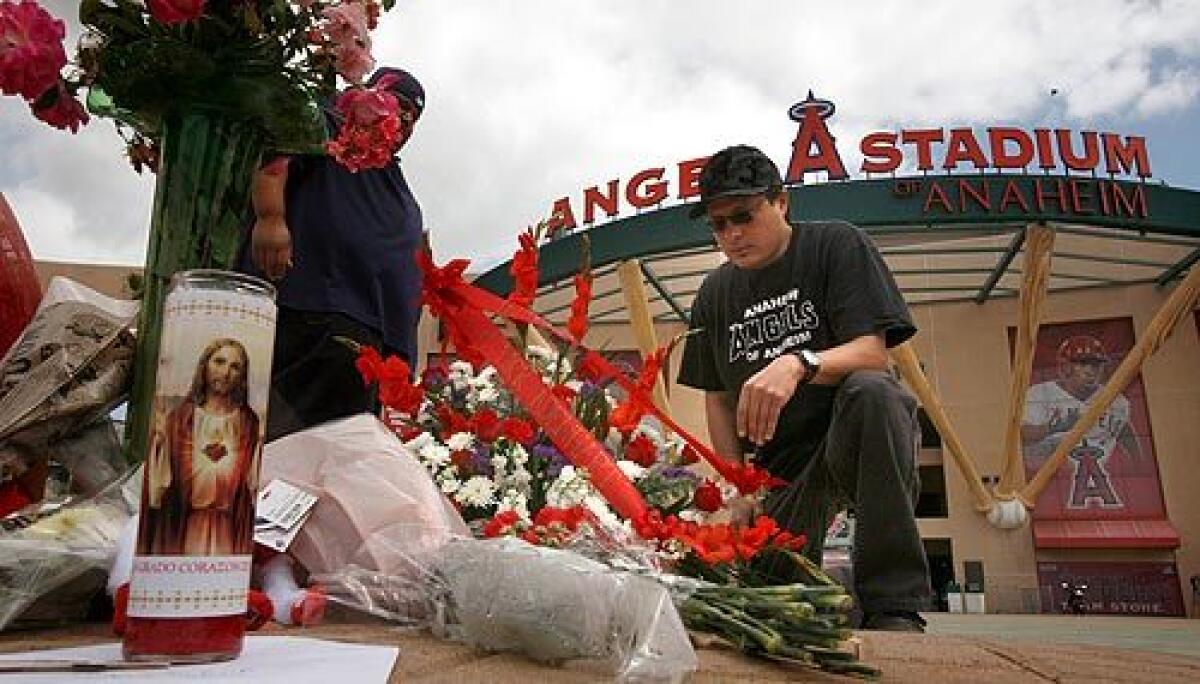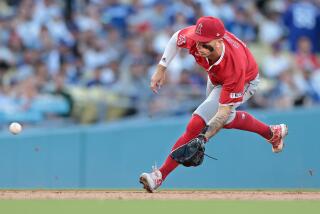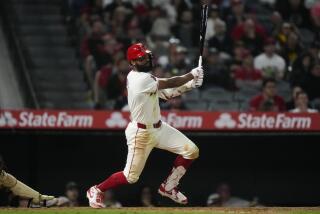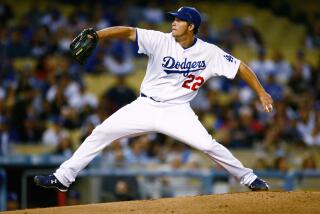For the Angels, a promising young arm arrives -- and then is lost

For a young pitcher who struggled for years with an injured arm and doubts that he could cut it in big league baseball, Nick Adenhart’s performance Wednesday night gave promise that he had finally arrived.
FOR THE RECORD: An article in Friday’s A section on the death of Angels pitcher Nick Adenhart quoted a fan as saying she went to Angel Stadium on Thursday to buy tickets but that “tonight’s game” had been postponed. Actually, she wanted tickets to Thursday’s game, which was postponed; Friday’s game is still scheduled.
But a few hours after the most impressive game of his brief career -- just seven miles from the mound where he threw six scoreless innings -- the 22-year-old right-hander was killed by an alleged drunk driver, the latest calamity in a baseball franchise haunted by a history of misfortunes.
Adenhart and two friends were killed early Thursday morning when their car was broadsided by a driver who police said had a suspended license and a previous drunk driving conviction. The news of the young pitcher’s death stunned friends, teammates and fans, some driving to the Fullerton intersection to place flowers and candles in the roadway and others going to Anaheim Stadium, seemingly just to be there.
“It’s not fair,” said Christina Jimenez, an ardent Angels fan who heard the news Thursday morning and went to the stadium to buy tickets to tonight’s game so she could support her favorite team and Adenhart’s extended family.
The game, however, was canceled and the only activity at the stadium beyond a growing memorial built by fans was a somber news conference attended by team officials.
Fighting tears, and finally lowering his head as he sobbed, Adenhart’s agent, Scott Boras, said the pitcher had been elated with his performance in Wednesday night’s game against the Oakland A’s.
“He felt like a major leaguer,” Boras said. “His life’s goal was to be a major league baseball player, and he certainly achieved that standard.”
The pitcher’s death was another painful addition to a lengthy list of tragedies that have shadowed the club, from the fatal drive-by shooting of a star outfielder to the suicide of a relief pitcher who blamed himself for a playoff loss that cost the team a trip to the World Series.
After Wednesday’s game, Adenhart was traveling in a Mitsubishi Eclipse driven by a friend, Courtney Frances Stewart, 20, of Diamond Bar, along with passengers Henry Pearson, 25, and Jon Wilhite, 24, both of Manhattan Beach.
Police said the four had just left Stewart’s apartment and were headed to a nearby dance club, In Cahoots, when they passed through a green light at the intersection of Orangethorpe Avenue and Lemon Street just after midnight.
There, police said, a Toyota Sienna minivan driven by 22-year-old Andrew Thomas Gallo of Riverside blew through a red light at 50 to 60 mph and struck the Eclipse.
Pearson, whom friends described as a law student, was killed along with Adenhart and Stewart, a Cal State Fullerton student. Wilhite, a former catcher for the Cal State Fullerton team, was in critical condition at UC Irvine Medical Center.
Police said Gallo, convicted in San Bernardino County of drunk driving in 2006 and marijuana possession the following year, ran from the scene but was quickly apprehended.
Fullerton Police Lt. Kevin Hamilton said his department planned to seek felony hit-and-run driving, DUI, vehicular manslaughter and, possibly, murder charges. A decision could be made today.
Gallo’s passenger, Raymond Alexander Rivera, 21, of Covina was taken to a hospital, but his condition was unknown. A third vehicle driven by Esteban Quiroz, 33, was involved, but there were no reports of injuries.
A makeshift shrine to Adenhart grew throughout the day on the brick pitcher’s mound outside the entrance to Angel Stadium, where fans left bouquets and other mementos. A sign read: “No. 34. One more Angel in Heaven.” Adenhart’s Angels jersey was draped over the dais at the stadium news conference, where Boras was overcome by emotion.
“Nick’s parents, Jim and Janet, wanted me to convey to the entire Angel organization the privilege and . . .” He stopped, his eyes filled with tears. “He’s a great kid.”
Adenhart’s father traveled to Anaheim to watch his son pitch Wednesday night and Boras said he recalled telling him something special might happen. Boras said he spoke with the young pitcher after the game and sensed his elation with his performance
“One of the most exciting things in this game is to see the glow on a kid’s face after he takes a tremendous step in his life,” the agent said. “Nick was a most accomplished kid.”
Players gathered in the clubhouse Thursday and met with Adenhart’s father. Center fielder Torii Hunter said they reminisced about Adenhart, his infectious sense of humor and desire to play the game.
“A lot of these guys in here have never lost anybody in their family that’s close to them,” Hunter said. “I hate that this happened, but this is part of life. This is the real deal. That’s why you’ve got to kiss your kids, kiss your family every day when you get up in the morning and before you leave for work.”
Angels Manager Mike Scioscia said Adenhart had struggled to reach the major league mound. “He just wasn’t some extreme talent that was blessed,” Scioscia said. “He fought to be here.”
Adenhart’s rise with the Angels reflected his faith in the team and the team’s faith in modern medicine. As a senior at Williamsport High School in Williamsport, Md., in 2004, Adenhart was projected to be one of the top picks in baseball’s annual draft, which would have made him an instant millionaire. But two weeks before the draft, Adenhart suffered a severe elbow injury that required reconstructive surgery.
The Angels picked him in the 14th round of the June 2004 draft, where signing bonuses generally run four figures. With the setback, Adenhart had planned to have the operation, attend the University of North Carolina and rebuild his status as a prospect on the school’s baseball team.
But the Angels, confident in the success of a procedure known as “Tommy John surgery” -- named for the former Dodger pitcher who first successfully underwent it -- persuaded Adenhart to sign and rehabilitate under their care. They persuaded him in part with a $710,000 signing bonus.
Adenhart was in his fifth professional season, most of it in the minor leagues, and made his big league debut last May against Oakland, becoming the youngest active-roster pitcher in the majors. His first and only major league victory came that month against the White Sox. This season, for the first time, Adenhart made the Angels’ opening day roster.
The Adenhart accident is the latest in a string of Angels tragedies. In the 1970s, infielders Chico Ruiz and Mike Miley and pitcher Bruce Heinbechner were killed in separate auto accidents, pitcher Minnie Rojas and catcher Ed Kirkpatrick were paralyzed in car crashes and outfielder Lyman Bostock was killed in a drive-by shooting while riding in a car with friends in Gary, Ind.
In 1986, one strike away from clinching the American league pennant for the Angels, relief pitcher Donnie Moore gave up a home run that allowed the Boston Red Sox to rally and reach the World Series. Moore, despondent, committed suicide three years later.
And last season, special assistant Preston Gomez was gravely injured when he was hit by a truck at a gas station on his way back from spring training. Gomez never recovered, dying in January at a Fullerton care center -- not far from the scene of the accident that killed Adenhart.
On Wednesday, the young pitcher -- like all of his teammates -- was wearing a memorial patch for Gomez.
christopher.goffard
@latimes.com
Times staff writers Bill Shaikin, Kevin Baxter, Mike DiGiovanna, Lisa Dillman, Tony Barboza and Ruben Vives contributed to this report.
More to Read
Sign up for Essential California
The most important California stories and recommendations in your inbox every morning.
You may occasionally receive promotional content from the Los Angeles Times.











